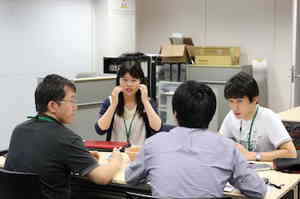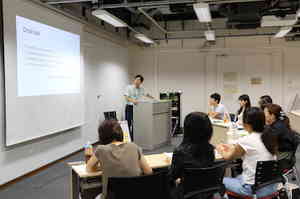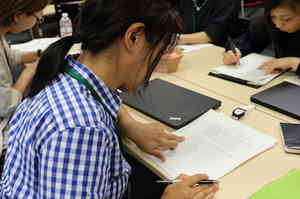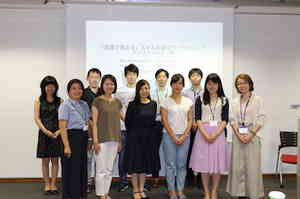September 20, 2018
Teaching in English: Polishing Your Discussion Facilitation Skills
| Tag | FDPAGE EnglishPostdocsGrad studentsFacultyNew InstructorsEnglish Academia |
|---|
【Event report】Teaching in English: Polishing Your Discussion Facilitation Skills
<About> Tuesday, September 18th, 2018
Professional and Global Educators’ Community (PAGE) organized a workshop “Teaching in English: Polishing Your Discussion Facilitation Skills.” The purpose of the workshop was to help the participants learn useful English phrases and a teaching method for facilitating discussions.
The workshop was held at the Faculty of Engineering Building 2, Hongo Campus. A total of 9 participants consisted of graduate students and young faculty members at the University of Tokyo. They came from diverse academic fields such as econometrics, educational psychology, immunology, insect virology, and community development. The participants were asked to work on two assignments before the workshop: 1) to learn “Module 7: Facilitating Group Discussions” of an online course “English Academia 1” (https://utokyo-ea.com) and 2) to prepare slides to give a mini-lecture that involves a discussion.
The main programs of the workshop were the mini-lectures given by the participants themselves. Firstly, they were divided into groups of three. Each of them gave a 15-minute mini-lecture in English and received 10-minute feedback. They were challenged to facilitate a discussion in English while giving lectures. The mini-lectures covered a wide variety of interesting themes such as “Should higher education be free?” “Why don’t bats die of Ebola virus infection?”
“What are the roles and effects of community cafés toward regional revitalization?”and “What can you do to realize SDGs (Sustainable Development Goals)?” Through playing the role of an instructor, they seemed to face the difficulty not only in facilitating the discussion in English but also in providing the other participants with prior knowledge required for the discussion in easy-to-understand English.
In the next session, the participants listened to a brief lecture on how to design discussions and worked on improving their mini-lectures.
They discussed the issues such as “how to support students who have difficulty in using English” and “how to intervene in a discussion when there are students who are not willing to speak or who speak too much,” and practiced speaking English phrases that could be used in such situations.
Finally, the participants gave a second try on their mini-lectures. They all seemed to refine their lectures by adopting the English phrases and the teaching method they had learned in the previous sessions. Some of them drastically changed the structure of their lectures from the first ones.
Here are some of the feedback we received from the participants after the workshop:
“Making a presentation twice made it easier for me to realize the specific points I needed to improve. The group size was also appropriate.”
“What I learned here was not only the facilitation skills but also skills in speaking English and preparing PowerPoint slides and how to structure the class.”
“It was very good. I haven’t used English for a while, so it was a nice opportunity. I am also satisfied with the chance to interact with people from other fields!”
PAGE will continue to hold workshops focusing on the improvement of academic communication skills in English. We sincerely look forward to your participation.
Click here for a free online program provided by the PAGE project: English Academia.↓
https://www.he.u-tokyo.ac.jp/englishacademia/en/
Click here for more details of the PAGE project.↓
https://www.he.u-tokyo.ac.jp/en/activities/page/




